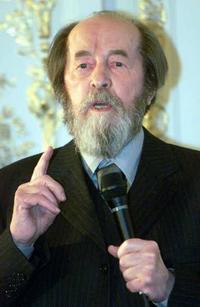Solzhenitsyn: Russia dogged by problems similar to those which led to 1917 revolution
Nobel laureate Alexander Solzhenitsyn, in the preface to a newly republished article about the revolutionary turmoil of 1917, warns that Russia is still struggling with challenges similar to those that led to the demise of the czarist empire.

The article which will appear Tuesday in the influential government daily Rossiyskaya Gazeta analyses the roots of the February revolution 90 years ago that forced the abdication of the last czar, Nicholas II, and helped pave the way for the Bolsheviks.
"It's all the more bitter that a quarter of a century later, some of these conclusions are still applicable to a disorder threatening us today," Solzhenitsyn wrote in a preface to the article, which was first published in Russia in 1993.
Solzhenitsyn's wife, Natalya, said it should serve as a reminder to Russia's political class about the dangers stemming from the huge gap between the rich and the poor and the stark contrast in lifestyle and moral attitudes between the glitzy Russian capital and far less prosperous provinces.
"Alexander Isayevich is deeply worried by this gap," Natalya Solzhenitsyn told a news conference Monday. "It's necessary to pay attention to that. If the government fails to do that, consequences would be grave."
In addition to being printed in the widely read, half-million-circulation newspaper, the article will be also published as a separate pamphlet under the title "Thoughts On The February Revolution" and sent to officials across Russia, Rossiyskaya Gazeta's editor Vladislav Fronin said.
"People from the (Ear Eastern) Chukotka region to the Kremlin would be able to read it," he said.
Natalya Solzhenitsyn said her husband wrote the article for one of the volumes of "The Red Wheel," the 10-volume saga about the Russian Revolution that he finished in 1990 and considers his most important work. The article has been published repeatedly, but never in such wide circulation, she said.
Solzhenitsyn was arrested for criticizing Stalin in a letter he wrote during World War II, in which he served as a front-line artillery captain, and spent seven years in a labor camp in Kazakhstan and three more years in internal exile.
He drew on his ordeal in the short novel "One Day in the Life of Ivan Denisovich," published in 1962 during a backlash against Stalin. Soon after, however, his writing was suppressed. Subsequent works including the three-volume "The Gulag Archipelago" (1973-78) were written in secret and only published abroad.
Solzhenitsyn won the Nobel Prize for Literature in 1970, and four years later was expelled from the Soviet Union.
Returning to Russia in 1994 to find a country in deep disarray, Solzhenitsyn's dismal view of 1990s Russia, along with his nationalism and hope for a resurgence of his country, has aligned him with President Vladimir Putin, who has presented his time in office as a period of recovery following economic and social turmoil at home and weakness on the world stage that Russia suffered after the 1991 Soviet collapse.
The 88-year-old has appeared rarely in public in recent years and his health is believed to be ailing. In rare print or broadcast interviews, he has lamented the state of Russian politics and government, but has also praised Putin despite the president's KGB background, reports AP.
His wife said Monday that Solzhenitsyn had a high opinion of the Kremlin's increasingly assertive foreign policy.
"He believes that many right steps have been taken in the foreign policy field, and Russia has regained its weight," Natalya Solzhenitsyn said.
Subscribe to Pravda.Ru Telegram channel, Facebook, RSS!





